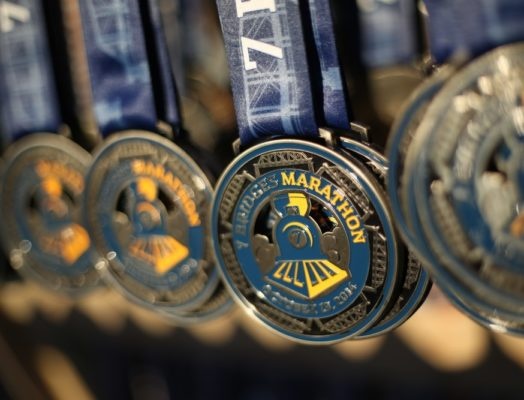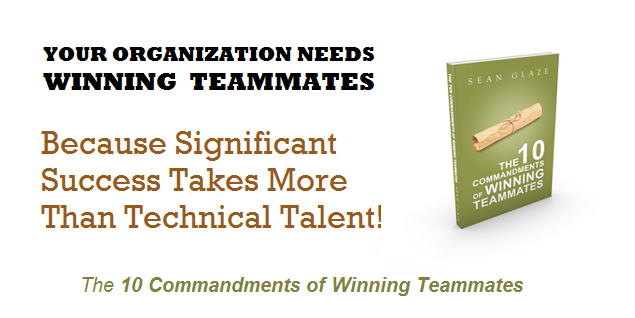 Let’s start by stating the obvious.
Let’s start by stating the obvious.
Marathons are hard. And marathons are far more of an individual challenge than a team activity.
So what does running a marathon have to do with you leading your team?
A good bit, actually…
First, a brief summary of my marathon experience:
My wife and I decided to take on the challenge, and we started to prepare almost five months out, following a training plan that we had found in our online research…
But despite nice race-day conditions, the marathon itself was even tougher than I expected.
I ran the first three miles or so without any issues. (my wife, who is a far better runner, had already moved ahead of me by then and ended up finishing almost 90 minutes before I did!).
Every couple of miles there was an aid station with volunteers who offered water, Gatorade, energy gels, and even bananas. But they, and various spectators along the route, also shared encouraging comments – which were very helpful and inspiring.
But by mile 11, I had begun to look at the clock and realized I still had 15 miles left… and I started to doubt my ability to finish. That feeling was magnified by the fact that, around mile 10, there was a long stretch of road without aid stations or spectators and their motivational signs and positive comments.
Somewhere around mile 17 things got even tougher – my legs started to tighten up. And I had to walk a good bit of the last 8 miles, and I said the “F” word to myself a lot…
(“finish” – what were you thinking?)
Somewhere around mile 23 I realized I was really going to do it. The finish line was something I could get to without the assistance of an ambulance.

And I somehow gathered up enough energy to run the last few hundred yards to the finish line ; )
Six hours and twenty-five minutes after I had started, I was done. I hugged my wife (who had finished much earlier), got something to eat, and took a few minutes to sit and just be grateful it was over.
So what are the take-away lessons for you and your team?
I think there are TWO main things that are relevant and applicable:
1. I was determined to finish because I had told others I was doing it.
I set the goal months ago, and even more importantly, I shared the goal with others.
My friends and family knew I had signed up to run the marathon.
When you share a goal – when you broadcast it to others – you automatically have a built in accountability network who will ask you about your progress!
The marathon-training plan I followed was 20 weeks long… and for most of those 20 weeks, people would ask: “how is it going?”
The day of the race, a handful of people texted me – and one of the things I found myself doing as I ran (and walked) the course on race day was thinking that I HAD to finish so I didn’t disappoint my son or my daughters…
So think about yourself and your team.
What is a goal that you have set that you could share with others to increase the commitment and accountability for finishing it successfully?
One of the most powerful motivators your team will experience is the pressure of expectations, and not wanting to explain why they didn’t do what they said were going to.
Instead of looking for excuses, your team will look for ways to succeed if they have broadcast their goals to other people.
2. I was able to finish because of the encouragement I got along the way.
Through most of the race, even though I had started well, I found myself in the back half of the pack.
And there were a few very lonely stretches of road that I (and many others) had to travel where there were no aid stations or supportive spectators with signs…
And those long stretches were the toughest parts of the race.
It was during those long lonely isolated times that I began to question my efforts and ability to finish.
It was during those times that I had to work hard to motivate myself to just… keep… going.
But then I would come to another aid station, and the volunteers would step out with smiles and cups of water and Gatorade and offer me energy gels and encouraging words that I was energized.
“You’re doing great!”
“keep going!”
“you can do this!”

Those words had an incredibly positive influence on my mood and effort.
I thanked them each time, because I realized that simple encouragements are powerful.
So how often do you leave your teammates out in lonely isolated stretches of effort without providing simple and powerful encouragements?
As a basketball coach, early in my career I thought that you were supposed to wait until the end-of-season banquet to congratulate teams on their efforts… and that was as ridiculous as it sounds.
But I did a poor job of encouraging my players – and our dip in effort toward the end of each season illustrated what I took a few years to learn.
Instead of driving them all the time to do more, faster, better… we would have enjoyed much more success if I had paused occasionally to refuel their tanks with encouraging words and appreciation.
People need encouragement along the way to get them to the finish line! Those encouraging words from volunteers, other runners, and spectators kept many runners going and gave me the motivation to jog instead of walk some of those last miles of the race.
If you want to energize your team to give more effort and to feel appreciated and inspired, you need to help them feel seen and supported.
Write a few notes… share a few positive comments in person… find ways to boost their morale.
Don’t let your people struggle too long in long stretches of isolation and doubt…
Marathons are not easy… and neither is teamwork
But it is usually the tough stuff – the challenging stuff – that people are most proud of when they look back over their careers.
If you want to help your team succeed, consider taking action on these two things:
Have them share the goal they are working toward with others to create accountability.
And have a plan in place to share encouragements and motivation along the way.
Your team will stop saying other “F” words, and will be far more likely to finish strong!

